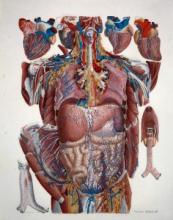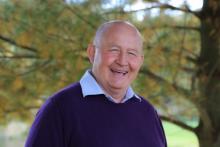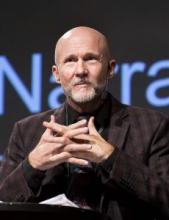Food Politics in 2018: A Humanities Perspective
March 23rd, 2018

In this lecture Marion Nestle, Paulette Goddard Professor, of Nutrition, Food Studies, and Public Health, Emerita, at New York University, discusses the idea that the paradox of today’s globalized food system is that food insecurity or obesity threaten the health and welfare of half the world’s population. Underlying these problems is an overabundant but inequitably distributed food system in which corporations are forced to expand markets to meet growth targets. The contradiction between business and public health goals has led to a large and growing movement to promote more healthful, environmentally sound, and ethical food choices and to identify a more equitable balance between individual and societal responsibility for those choices.
Symposium – Beyond Empathy: Critical Perspectives on Medicine, Society and Culture
March 24th, 2018

This day-long symposium will feature presentations on the vibrant field of medical humanities, addressing a variety of unsettled questions, such as: How can humanistic and social science disciplines take account of one another’s insights for the study of health and medicine? How should these fields best inform clinical practice? And what, ultimately, is medical humanities for? Participants will include faculty and students from the humanities and social sciences, the School of Medicine, and the Cleveland Clinic. The program will include a demonstration in the Cleveland Museum of Art on the critical study of visual arts to train medical students in the skill of clinical observation.
Therapeutic Process Using Narrative: A Vulnerable Reading of Shakespeare’s “The Tempest”
March 26th, 2018

Life’s problems are often best approached in companionship with a story that offers guidance, and what guidance that is can vary considerably. The Hamlet in the Hospital project involves small groups performing readers’ theatre and then talking about how the play might be a companion in their work and lives. In this talk, Arthur Frank, Professor Emeritus of Sociology at the University of Calgary, Professor at VID Specialized University, Bergen, Norway, and core faculty at the Center for Narrative Practice in Boston, will discuss how in these discussions, they practice what he calls “vulnerable reading”; that is, reading to discover how a literary work can be a companion during times of suffering.
Quacks, Charlatans, and Geniuses: Medicine in Ancient Greece
March 27th, 2018

The Greeks laid the foundation for Western medicine, but much of what we know about their medical practices seems rather unpromising. Did eating a boiled mouse cure infant teething? Why should a doctor consult a patient’s horoscope? What did a surgery competition entail? Why was dissection forbidden? James C. McKeown, Professor of Classics at the University of Wisconsin – Madison and author of A Cabinet of Ancient Medical Curiosities: Strange Tales and Surprising Facts From the Healing Arts of Greece and Rome (2017), introduces us to some of the more curious realities of what happened when Socrates needed a doctor.
Honoring the Story of Care
April 2nd, 2018

In his talk, Craig Irvine, Ph.D., Director of the Master’s Program in Narrative Medicine and founder and Academic Director of the Program in Narrative Medicine at Columbia University, proposes that the care of the sick unfolds in stories. The effective practice of healthcare requires the ability to recognize, absorb, interpret, and act on the stories and plights of others. Narrative Medicine addresses the need of patients and caregivers to voice their experience, to be heard and to be valued, and it acknowledges the power of narrative to change the way care is given and received.
Film Screening and Discussion – They Shall Not Perish: The Story of Near East Relief
April 13th, 2018
This documentary details the unprecedented humanitarian efforts of thousands of Americans who saved a generation of orphans and refugees during the collapse of the Ottoman Empire and in the aftermath of the crisis that came to be known as the Armenian Genocide. The screening will be followed by a panel discussion led by Kenneth Ledford, Associate Professor in the Department of History and will include the film’s Executive Producer, Shant Mardirossian.
Graduate Student Work-in-Progress – Rereading the Technomasculine Narrative: Performing Identity Through Video Games in Underground Hip Hop
April 19th, 2018

Location: Clark Hall Room 206, 11130 Bellflower Road, Cleveland, OH 44106
Video games are ubiquitous in American culture today, and their sounds have worked their way into the popular soundscape over the past half-century. In this lecture, Musicology PhD Candidate Kate Rogers examines how current underground hip hop musicians use game sounds and topics as platforms for exploring identity, questioning stereotypes of race and gender, and advocating for social justice.
Pre-lecture reception begins at 4:15 pm.
2018 Joseph and Violet Magyar Lecture in Hungarian Studies – A Specter Haunting Europe: The Myth of Judeo-Bolshevism in Hungary and Eastern Europe
April 24th, 2018
For much of the twentieth century, Europe was haunted by a threat of its own imagining: Judeo-Bolshevism. This myth—that Communism was a Jewish plot to destroy the nations of Europe—was a paranoid fantasy. And yet fears of a Jewish Bolshevik conspiracy took hold during the Russian Revolution and spread across Europe. In this talk, Professor Hanebrink, Associate Professor of History at Rutgers, asks why the myth of Judeo-Bolshevism endured for so long in Hungary and Eastern Europe and what legacy this idea has left for contemporary politics in the region.
- Home
- Events
- Past Events
- 2017-2018

